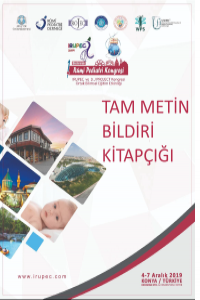Abstract
References
- References 1- Macintosh JL, Eden LM, Luthy KE et al. Global Immunizations: Health promotion and disease prevention worldwide. MCN: The American Journal of Maternal/Child Nursing, 2017; 42, 3, 139-45. 2- WHO, 2018a. Immunization coverage. Erişim tarihi,12 Kasım 2018. Erişim adresi, https://www.who.int/en/news-room/fact-sheets/detail/immunization-coverage 3- Alruwaili AAS, El-fetoh NMA, Alruwaili TAS, et al. Knowledge, attitude and practice of the parents regarding child vaccinations in arar, Northern Saudi Arabia. Egyptian Journal of Hospital Medicine, (July 2018; 72(9): 5178-82. 4- Argüt N, Yetim A, Gökçay EG. The factors affecting vaccination acceptance. J Child, 2016; 16(1-2):16-24. 5- Erdem Ö, Toktaş İ, Çelepkolu T, Demir V, 2017. he Characteristics of Families who rejected Vaccination during the Mop-up Oral Polio Vaccination Campaign and Their Reasons of Rejection: A Family Health Center Experience. Konuralp Medical Journal, 2017; 9, 1, 19-3. 6- Bhat-Schelbert K, Lin CJ, Matambanadzo A, Hannibal K, Nowalk MP, Zimmerman RK, 2012. Barriers to and facilitators of child influenza vaccine - perspectives from parents, teens, marketing and healthcare professionals. Vaccine, 30, 14, 2448-52. 7- Ilah BG, Sakajiki AM, Musa A, Edem B, Adelakun MB, Adeniji AO, Kaura NB. Immunization and socioeconomic status of children 12-59 months attending a specialist hospital, Gusau, Nigeria, Gusau, Nigeria. Ann Trop Med Public Health 2015;8:23-7 8- Canbolat KS. Kentsel bölge toplumunun çocukluk çağı aşılarına yönelik tutumlarının sağlık inanç modeline göre değerlendirilmesi. Yüksek Lisans Tezi. Selçuk Üniversitesi Sağlık Bilimleri Enstitüsü, Konya, 2018. 9- TTB, 2018. https://www.ttb.org.tr/haber_goster.php?Guid=15ecd2f0-449d-11e8-b46f-14b550714509. Erişim tarihi:30.05.2019 10- Gülgün M, Fidancı K, Karaoğlu A, Güneş Ö, Kesik V, Altun S, Babacan O, Saldır M. Investigation of 0-24 months vaccination status in children applied to pediatric outpatient cliniz in a military hospital. . Gulhane Medical Journal, 2014; 56: , 1. 11- Reich JA, 2018. “We are fierce, independent thinkers and intelligent”: Social capital and stigma management among mothers who refuse vaccines. Social Science & Medicine.1-9.
Abstract
This study was conducted to determine the knowledge, thoughts and attitudes of mothers about childhood immunization.
Methods: The universe of the descriptive type study was created by mothers with children between the ages of 0-2 who were admitted to the child for any reason in the children's services and neonatal intensive care unit of Selcuk University Medical Faculty Hospital. In the study, the sample size was determined as a result of the power analysis. The study was carried out with 176 mothers by random sampling method. The data were collected using the data collection form and the Vaccine-related Community Attitude-Health Belief Model Scale. Ethical principles were observed during the investigation.
Results:
It was determined that 12.3% of the mothers who participated in the study found vaccines harmful and 91.3% trusted vaccines. The scale lower size scores (except for the perceived obstacle subsize) of mothers who found vaccines harmful were found to be significantly lower. In addition, mothers who thought that vaccination should be mandatory and mothers who thought that vaccination should not be left to parental request, the social attitude-health belief model scale on the vaccine was determined to have significantly higher score averages. (p<0.05).
Conclusion:
As a result of the study, it was determined that the average health responsibility and perceived benefit score scoring was higher in the sub-dimensions of the Vaccine-related Community Attitude-Health Belief Model scale. Some thoughts about vaccines were found to affect attitudes about vaccines. In order to reduce the negative attitude towards vaccines, it is recommended that parents intensify awareness efforts.
Keywords
References
- References 1- Macintosh JL, Eden LM, Luthy KE et al. Global Immunizations: Health promotion and disease prevention worldwide. MCN: The American Journal of Maternal/Child Nursing, 2017; 42, 3, 139-45. 2- WHO, 2018a. Immunization coverage. Erişim tarihi,12 Kasım 2018. Erişim adresi, https://www.who.int/en/news-room/fact-sheets/detail/immunization-coverage 3- Alruwaili AAS, El-fetoh NMA, Alruwaili TAS, et al. Knowledge, attitude and practice of the parents regarding child vaccinations in arar, Northern Saudi Arabia. Egyptian Journal of Hospital Medicine, (July 2018; 72(9): 5178-82. 4- Argüt N, Yetim A, Gökçay EG. The factors affecting vaccination acceptance. J Child, 2016; 16(1-2):16-24. 5- Erdem Ö, Toktaş İ, Çelepkolu T, Demir V, 2017. he Characteristics of Families who rejected Vaccination during the Mop-up Oral Polio Vaccination Campaign and Their Reasons of Rejection: A Family Health Center Experience. Konuralp Medical Journal, 2017; 9, 1, 19-3. 6- Bhat-Schelbert K, Lin CJ, Matambanadzo A, Hannibal K, Nowalk MP, Zimmerman RK, 2012. Barriers to and facilitators of child influenza vaccine - perspectives from parents, teens, marketing and healthcare professionals. Vaccine, 30, 14, 2448-52. 7- Ilah BG, Sakajiki AM, Musa A, Edem B, Adelakun MB, Adeniji AO, Kaura NB. Immunization and socioeconomic status of children 12-59 months attending a specialist hospital, Gusau, Nigeria, Gusau, Nigeria. Ann Trop Med Public Health 2015;8:23-7 8- Canbolat KS. Kentsel bölge toplumunun çocukluk çağı aşılarına yönelik tutumlarının sağlık inanç modeline göre değerlendirilmesi. Yüksek Lisans Tezi. Selçuk Üniversitesi Sağlık Bilimleri Enstitüsü, Konya, 2018. 9- TTB, 2018. https://www.ttb.org.tr/haber_goster.php?Guid=15ecd2f0-449d-11e8-b46f-14b550714509. Erişim tarihi:30.05.2019 10- Gülgün M, Fidancı K, Karaoğlu A, Güneş Ö, Kesik V, Altun S, Babacan O, Saldır M. Investigation of 0-24 months vaccination status in children applied to pediatric outpatient cliniz in a military hospital. . Gulhane Medical Journal, 2014; 56: , 1. 11- Reich JA, 2018. “We are fierce, independent thinkers and intelligent”: Social capital and stigma management among mothers who refuse vaccines. Social Science & Medicine.1-9.
Details
| Primary Language | English |
|---|---|
| Subjects | Health Care Administration |
| Journal Section | Congress Proceedings |
| Authors | |
| Publication Date | December 10, 2019 |
| Acceptance Date | January 16, 2020 |
| Published in Issue | Year 2019 Volume: 7 Issue: Ek - IRUPEC 2019 Kongresi Tam Metin Bildirileri |


